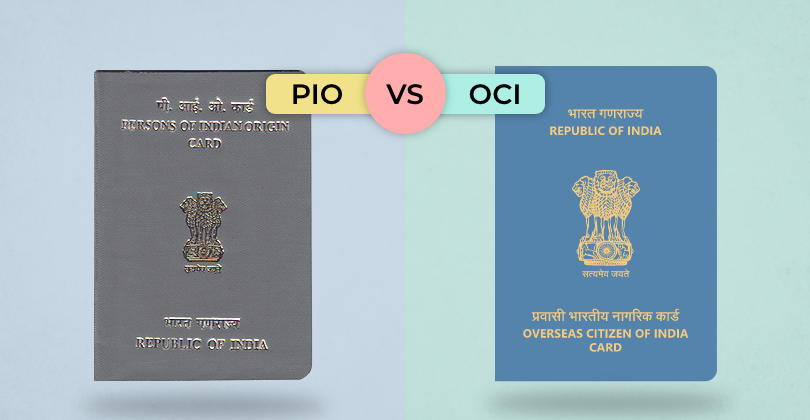Are you of Indian origin and living abroad? You've probably come across terms like PIO and OCI. These cards offer different benefits, but it can
Are you of Indian origin and living abroad? You've probably come across terms like PIO and OCI. These cards offer different benefits, but it can be tricky to understand what each one means.
This blog will explain PIO and OCI cards, their key differences, and why they are essential. We'll also discuss how a personal or travel loan can support your plans to visit India.
Whether you're planning a trip or simply want to understand your options better, we've got all the details you need. Let's get started and explore PIO and OCI cards!
Meanings and Definitions
Knowing the difference between PIO and OCI is essential for anyone of Indian origin living abroad. This distinction helps you choose the right card for your needs. Both PIO and OCI cards offer unique benefits, but it's essential to understand their differences.
Overseas Citizen of India (OCI)
- It is an immigration status that allows foreign citizens of Indian origin to live, study, or work in India. OCI card holders can visit India anytime and stay for any duration. This article explains what OCI means and highlights the benefits of holding an OCI card.
Person of Indian Origin (PIO)
- It refers to a foreign citizen who holds an Indian passport at any time or whose parents, grandparents, or great-grandparents were citizens of India. Understanding what a PIO card means helps distinguish it from an OCI card.
OCI vs PIO: A Comparison
Understanding the difference between PIO and OCI is essential for anyone of Indian origin living abroad. The OCI PIO card serves different purposes based on the individual's needs. Knowing what PIO is, what a PIO card is, and the difference between PIO and OCI helps make an informed decision.
If you're considering the OCI (Overseas Citizen of India) or PIO (Person of Indian Origin) card, it's important to understand the distinct benefits and privileges each offers. Both cards provide significant advantages to individuals of Indian origin residing abroad.
Knowing the meaning of OCI and PIO, as well as their key differences, will help you determine which card aligns best with your specific needs and circumstances.
Basic Details
| Parameter | OCI | PIO |
|---|---|---|
| Eligibility | Foreign citizens of Indian origin | Foreign citizens who held an Indian passport or have Indian ancestry |
| Visa Requirement | No visa required | No visa required |
| Parameter | OCI | PIO |
|---|---|---|
| Eligibility | Foreign citizens of Indian origin | Foreign citizens who held an Indian passport or have Indian ancestry |
| Visa Requirement | No visa required | No visa required |
Application Process
| Parameter | OCI | PIO |
|---|---|---|
| Where to Apply | CKGS Application Center | CKGS Application Center |
| Processing Time | 8-10 weeks | 4-6 weeks |
| Documentation |
|
|
| Parameter | OCI | PIO |
|---|---|---|
| Where to Apply | CKGS Application Center | CKGS Application Center |
| Processing Time | 8-10 weeks | 4-6 weeks |
| Documentation |
|
|
Validity and Renewal
| Parameter | OCI | PIO |
|---|---|---|
| Visa Validity | Lifelong validity | Valid for 15 years |
| Stay Duration | No restriction | Must register after 180 days |
| Re-issuance |
|
Every 15 years |
| Parameter | OCI | PIO |
|---|---|---|
| Visa Validity | Lifelong validity | Valid for 15 years |
| Stay Duration | No restriction | Must register after 180 days |
| Re-issuance |
|
Every 15 years |
Benefits
| Parameter | OCI | PIO |
|---|---|---|
| Registration Requirement | Not required | Required after 180 days |
| Economic/Educational Benefits | Same as Indian citizens | Same as Indian citizens |
| Visa Requirement | No visa required | No visa is required for 15 years |
| Parameter | OCI | PIO |
|---|---|---|
| Registration Requirement | Not required | Required after 180 days |
| Economic/Educational Benefits | Same as Indian citizens | Same as Indian citizens |
| Visa Requirement | No visa required | No visa is required for 15 years |
Fees
| Parameter | OCI | PIO |
|---|---|---|
| Fees |
|
₹15,000 for adults, ₹7,500 for children under 18 |
| Parameter | OCI | PIO |
|---|---|---|
| Fees |
|
₹15,000 for adults, ₹7,500 for children under 18 |
Interchanging Status
| Parameter | OCI | PIO |
|---|---|---|
| Change Status | OCI card holders generally do not change to PIO status | PIO cardholders can surrender the PIO card and get an OCI card |
| Parameter | OCI | PIO |
|---|---|---|
| Change Status | OCI card holders generally do not change to PIO status | PIO cardholders can surrender the PIO card and get an OCI card |
Critical Differences Between OCI and PIO Cards for Living in India
Here's a brief overview of how OCI and PIO cards impact daily activities in India:
Financial and Economic Rights
OCI and PIO: Both cardholders can obtain a driver's licence and PAN card, open bank accounts, and invest in India, except in plantations and agricultural properties.
Employment Options in India
OCI: OCI cardholders do not need an employment visa and can settle in India permanently. They face no employment restrictions except in sectors requiring special permits.
PIO: PIO cardholders do not need an employment visa either. However, if they stay for more than 180 days, they must register with the nearest FRO office. They also face no employment restrictions except in sectors requiring special permits.
Education Rights
OCI and PIO: Both cardholders do not need an education visa. Their children can enrol in academic institutes under the NRI quota.
Tax Liabilities
OCI and PIO: Income earned in India is subject to taxation, depending on RNOR or ROR status. Owning immovable property is not taxed, but profits from selling it are taxable.
Acquisition of Indian Citizenship
OCI: OCI cardholders can apply for Indian citizenship after five years of registration. They must stay in India for one year before applying.
PIO: PIO cardholders must stay in India for at least seven years to qualify for Indian citizenship. They must also surrender their current citizenship, as India does not allow dual citizenship.
Restrictions
Both OCI and PIO:
- Cannot vote or own agricultural property.
- Cannot hold constitutional positions like MP, President, or judge.
- Special permits are needed for research, missionary work, mountaineering, and entering protected areas.
Knowing these differences helps you choose the right card. Note that the PIO card is valid only till 31st December 2024, and individuals must apply for an OCI card.
Ready to Choose the Right Card?
Choosing between an OCI (Overseas Citizen of India) and a PIO (Person of Indian Origin) card can be confusing, especially when you have ties to India and need the right documentation for your stay or work. Whether you're interested in settling, studying, or investing in India, understanding the benefits and requirements of each card is crucial.
For Indian citizens who need financial assistance for their travels, KreditBee offers convenient and accessible personal loans exclusively tailored for residents of India. Our 100% online services provide loans ranging from ₹3,000 to ₹5 Lakhs with a hassle-free documentation process. Whether your plans involve domestic travel or a trip abroad, KreditBee can help make your journey smoother.
Frequently Asked Questions
NRIs are Indian citizens living abroad, while PIOs have Indian ancestry but foreign citizenship.
Yes, PIO cards are valid until December 31, 2024
Yes, if the local laws of at least one country allow dual citizenship.
If they stay in India for over 182 days in the preceding 12 months.
As of 2024, PIO cardholders must stay for seven years, and OCI cardholders must remain for one year.
Yes, as of 2024, they are liable to be taxed.
No, as of 2024, they do not need an education visa. Their kids can enrol under the NRI quota.
AUTHOR
KreditBee As a market leader in the Fintech industry, we strive to bring you the best information to help you manage finances better. These blogs aim to make complicated monetary matters a whole lot simpler.







